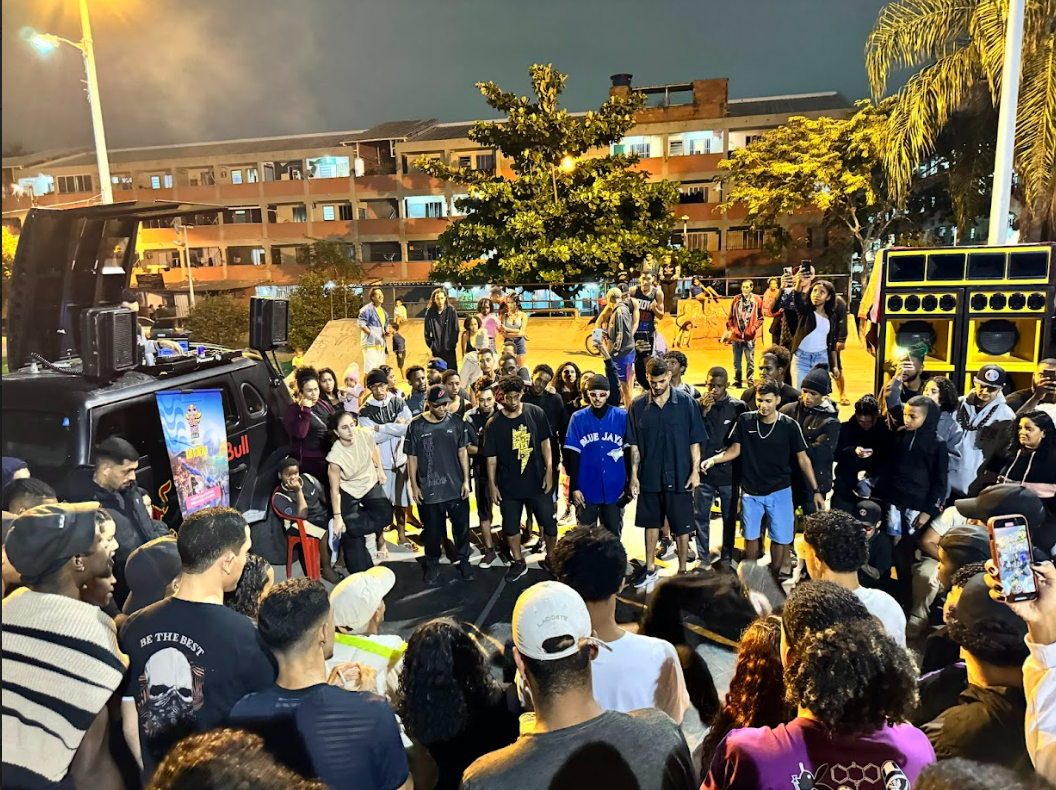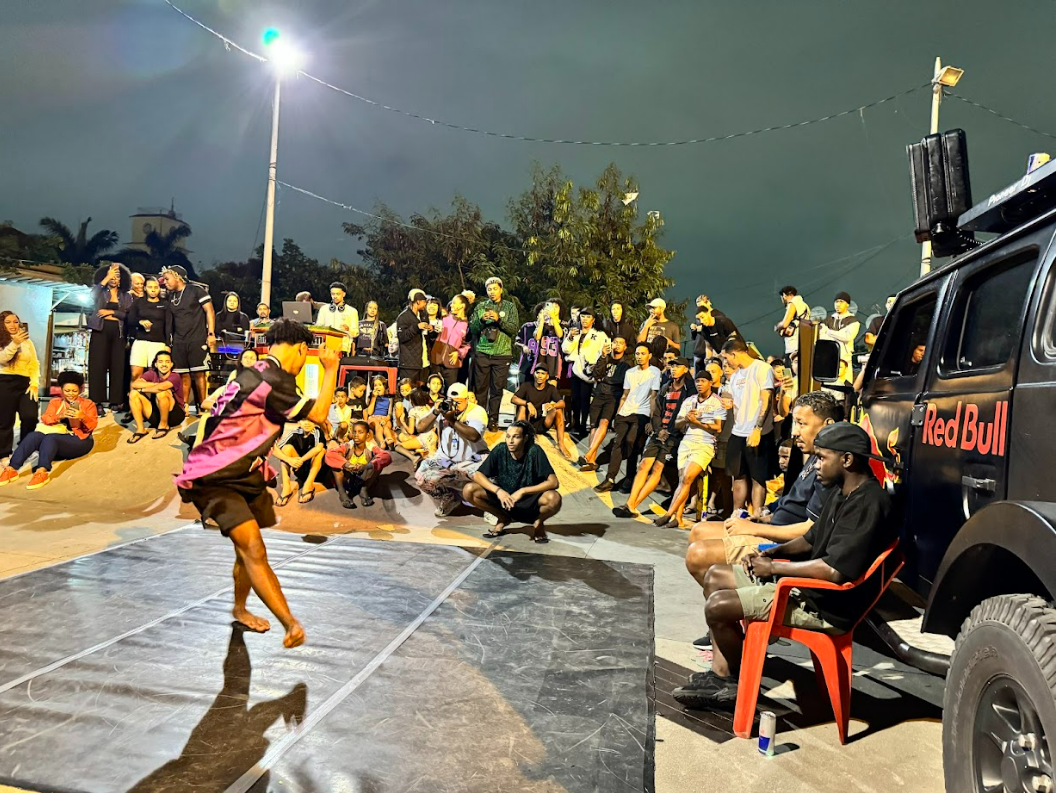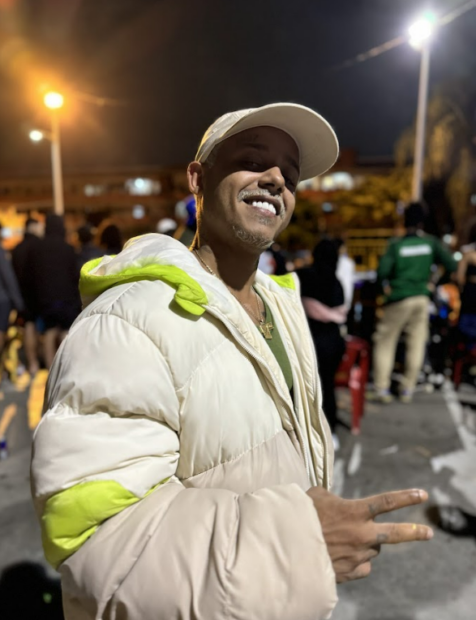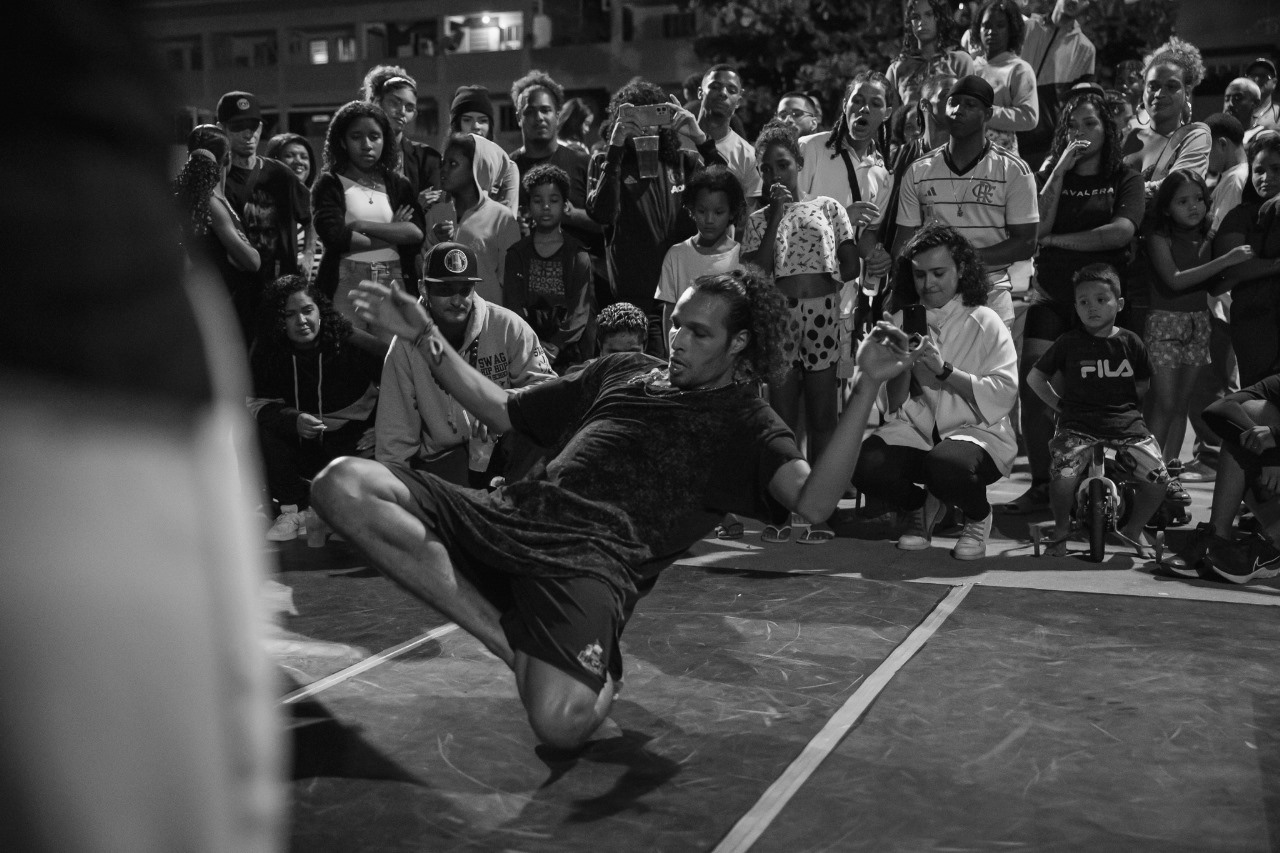
Clique aqui para Português
This Brazilian Black Awareness Month, RioOnWatch celebrates two recent milestones for Afro-diasporic culture: the debut of breakdancing in the Olympics and the enactment of Rio de Janeiro State Law 10.289/2024, which recognizes the dance form of passinho as Intangible Cultural Heritage. While breakdancing originated within hip-hop culture, passinho is deeply rooted in carioca funk.
Passinho: A Cultural Expression of Black Youth and a Heritage of Rio
In just over two decades, passinho has transcended the alleys of Rio de Janeiro’s favelas, where it was born in the vibrant funk dances of the mid-2000s, to become a global phenomenon. This infectious dance combines the energy of breakdancing with the sway of funk, the joy of samba, the playfulness of frevo, and the strength of capoeira. As creations of the African diaspora, these cultural expressions carry the history, resilience, and creativity of Afro-descendant communities. Inheriting this rich tradition, passinho offers yet another reinvention through a contemporary dance that has captivated the world, breaking down barriers and prejudice, and reaching renowned stages such as the closing ceremony of the 2012 London Paralympics and the opening ceremony of the Rio Olympics in 2016.
Passinho has now been officially recognized as Intangible Cultural Heritage of Rio de Janeiro, a milestone that celebrates the richness and strength of Rio’s favela culture. State Law No. 10.289/2024, which enshrines passinho as Intangible Cultural Heritage of Rio de Janeiro, was authored by State Deputy Verônica Lima. On her social media, the parliamentarian celebrated this achievement.
“Turning passinho into heritage is about giving visibility to this important cultural movement, while also helping decriminalize funk and the artistic expressions of young people from working-class communities, favelas, and peripheral areas, strengthening our popular culture. Long live this rich and meaningful artistic expression, so relevant to the lives of so many youth from the periphery.” — State Deputy Verônica Lima
The achievement of the Intangible Cultural Heritage title is the result of a long struggle for the recognition of passinho as cultural expression, to overcome the stigmas surrounding favelas which permeate so many Brazilian cultural manifestations. Severo IDD, MC and leader of the Bonde Imperadores da Dança group, celebrates the culture of Rio’s periphery and the strength of passinho. As one of the creators of the passinho training sessions, he notes that these gatherings have taken place for ten years at the PAC Manguinhos Skate Plaza, in Rio’s North Zone, and also mentions the “passinho invites” event held frequently at the same location.
“Everyone already knows that passinho is culture. Here in Manguinhos, the skate ramp has been our stage for passinho training sessions for ten years. To celebrate this decade of dance and culture, we decided to create the Showdown Battle: Breaking vs. Passinho.” — Severo IDD
Ver essa foto no Instagram
Another passinho icon, Cebolinha, a historic figure in favela culture, has witnessed the dance style’s growth and evolution over the past twenty years since its inception.
“Passinho is our dance, it’s culture. Seeing it evolve and refine itself is amazing!” — Cebolinha

It is believed that passinho originated in the Jacarezinho favela, in the North Zone, driven by the talent and charisma of groups like Bonde Imperadores da Dança, led by the iconic Anderson “Baianinho” Santana. From Jacaré to the world: the story of these dance emperors spread globally through viral videos and electrifying competitions, such as the Passinho Battle. It’s important to remember that Jacarezinho is the Blackest favela in the city, with roots in a quilombo (lands occupied by the descendants of enslaved peoples traceable to the same location).
Alongside Severo IDD and Isaque IDD, leaders of Bonde Imperadores da Dança, Baianinho is an iconic figure in the history of passinho. Manguinhos’ Skate Plaza, the stage for the event celebrating its recognition as cultural heritage, also witnessed the journey of these artists who have been taking favela dance to all corners of the world since 2008. “[Dance group] Havaianos used to call themselves the kings of dance. So, we looked for something even greater and found it: emperors. We are the Emperors of Dance,” recalls Baianinho, the founder and original member of the group, as he reflects on the origin of the name of the group he helped create.

Another passinho artist, with more recent success, is Pablinho Fantástico. The dancer and influencer has over 700,000 followers on social media. He is known for drawing crowds and has traveled the world thanks to passinho. He has been invited to lead workshops, give interviews, and participate in events in countries such as Morocco.
“This achievement is a milestone for all of us who love and live passinho. It is proof that our culture has value and deserves to be recognized and celebrated. The kids who want to dance need to dedicate themselves and put in the effort because now passinho has an even more special place in the history of Rio de Janeiro.” — Pablinho Fantástico
The recognition of passinho as Cultural Heritage has further boosted the organization of events and battles dedicated to the dance style, such as Passinho Invites x Break in Manguinhos and Passinho da ZO, which took passinho culture to different communities in Rio’s West Zone.
“The passinho training sessions with Imperadores da Dança at the skate ramp are celebrating ten years and offer the largest free sessions open to the public. Here, we welcome dancers from all styles, from around the globe. Many dancers who trained here have gone on to join major dance companies. Organizing passinho events and battles strengthens local culture, supports merchants, and encourages the continuation of the funk movement.” — Diana Anastácia, cultural producer and director of Braba Productions
The Manguinhos project was created by Braba Productions with the support of Brazil’s federal government’s Ministry of Culture and Rio de Janeiro’s City Hall through its Municipal Secretary of Culture, via the Local Actions Call for Proposals.
Ver essa foto no Instagram
In addition to the battle performance, the competition for the cash prize was fierce. Coyote, a 27-year-old dancer and member of the groups Os Mister Passistas and Corre Group, claimed first place and took home the prize of R$500 (~US$88). The moment was made even more special by the recognition and valuable tips provided by Jeff Cebolinha, one of the judges and an icon in the history of passinho. Moved, Coyote expressed his gratitude for the opportunity to dance and learn from his idols, emphasizing the resilience of passinho culture. With his feet on the ground and his eyes on the stars, Coyote plans to improve his skills and compete in other battles.

Manguinhos is just one of many favelas where passinho battles take place. In addition to being spaces for leisure and enjoyment, these battles serve as a vehicle for social mobility for young people, who find in dance a way to express their talents and gain recognition. Like funk, passinho is a humanitarian tool in the favelas.
Passinho’s Older Sibling is an Olympic Sport
Debuting at the Paris 2024 Olympics, breakdancing is one of the influences behind passinho. The urban dance style that emerged in the 1970s in New York City has now been recognized as a sport and made its Olympic debut in France. This Olympic discipline is part of hip-hop culture, and with its inclusion, the International Olympic Committee (IOC) attracted a younger audience to the Games. No Brazilian athletes qualified for the competition.
However, in another international breaking competition, Brazilian Samuel Henrique, known as b-boy Samuka from the federal capital of Brasília, won the championship title at the Fujifilm Instax Undisputed in Tokyo. As a result, he made a special appearance at the opening ceremony of the Olympic Games.
Ver essa foto no Instagram
Samuel Lenister, a b-boy, producer, and director of Grupo Favela RJ from the favelas of Complexo do Alemão in the North Zone, celebrates the recognition of breakdancing, seeing this achievement as a gateway for dancers, offering prospects for careers and professional recognition.
“Many people today make a living from breaking. I have friends who make good money from it. The Olympics… can bring social changes to these lives… Dancers have to be physically prepared; they need to have focus and discipline. Here at the Favela Group, we seek to develop our students to the fullest, and the kids have been preparing themselves. Many are taking language classes, and with this encouragement, they now envision a professional future in dance, and that is amazing.” — Samuel Lenister
Lenister also speaks about the evolution of dance and the importance of passinho in urban culture.
“Dance has been evolving over time. And through this culture, we have been able to create a passinho that is truly a dance of our own. Today, passinho has been embraced with open arms, so for us, it’s rewarding to be able to bring passinho and breaking together. They are two energies that mix, transform, and complement each other.” — Samuel Lenister

Completing his remarks on the importance of representation and sport, he says:
“I really like the Olympics, and this effect of inspiring us to become athletes is wonderful. Seeing these Black women winning gold, showcasing the strength and talent of our people, is inspiring for all of us, especially for young people from humble backgrounds. Sport is a powerful tool for social change, and these victories show that the dream is possible, that we can make it.”
Ver essa foto no Instagram
Shortly after the Olympics, on August 14, it was announced that breakdancing will not be part of the 2028 Olympics in Los Angeles. The reason has not yet been disclosed by the IOC. However, it is speculated that the difficulty in establishing clear criteria for evaluating performances, combined with the ongoing renewal of the Olympic program, may have influenced the decision. Following a controversial performance by Australian b-girl Rachael Gunn, which sparked criticism and memes on social media, the discipline has become a topic of debate and scrutiny.
Ver essa foto no Instagram
Severo IDD deeply laments that a dance with over 50 years of tradition will not be included in the upcoming Olympics.
“For breaking to remain a permanent part of the Olympics, it has to be included in three consecutive Olympic Games. I think they [the Olympic Committee] will give the idea more thought—whether out of concern for the loss of breaking’s roots, due to organizational failures, or perhaps because the host city [Los Angeles] wants to invest in other sports like cricket, flag football, squash, baseball, and lacrosse… The Australian b-girl’s performance was really quite unfortunate, but that’s not the reason breaking won’t be included next time. However, it did impact the whole, as people unfamiliar with hip-hop culture are judging it.” — Severo IDD
About the author: Juliana Portella was born and raised in the Baixada Fluminense and holds a degree in Journalism from the Federal Rural University of Rio de Janeiro (UFRRJ). She is a researcher at the Center for Studies on Peripheries (NEsPE/FEBF-UERJ) and a master’s student in the Graduate Program in Education, Culture, and Communication in Peripheries at the State University of Rio de Janeiro (UERJ). A documentarian, she directed the film that tells the story of the corridor dance parties of the 1990s.
